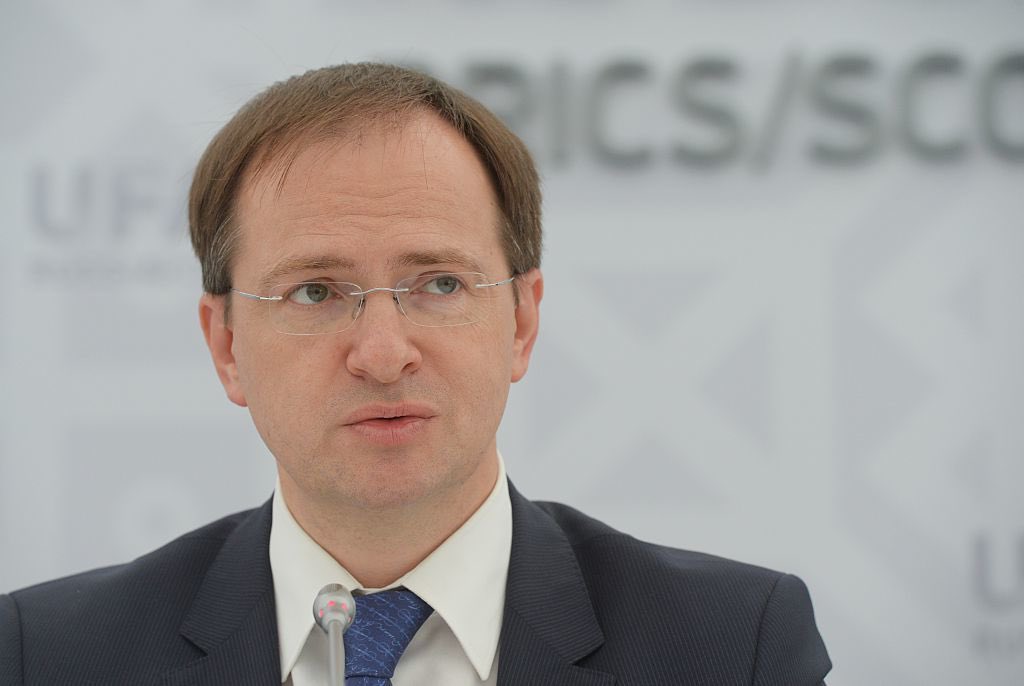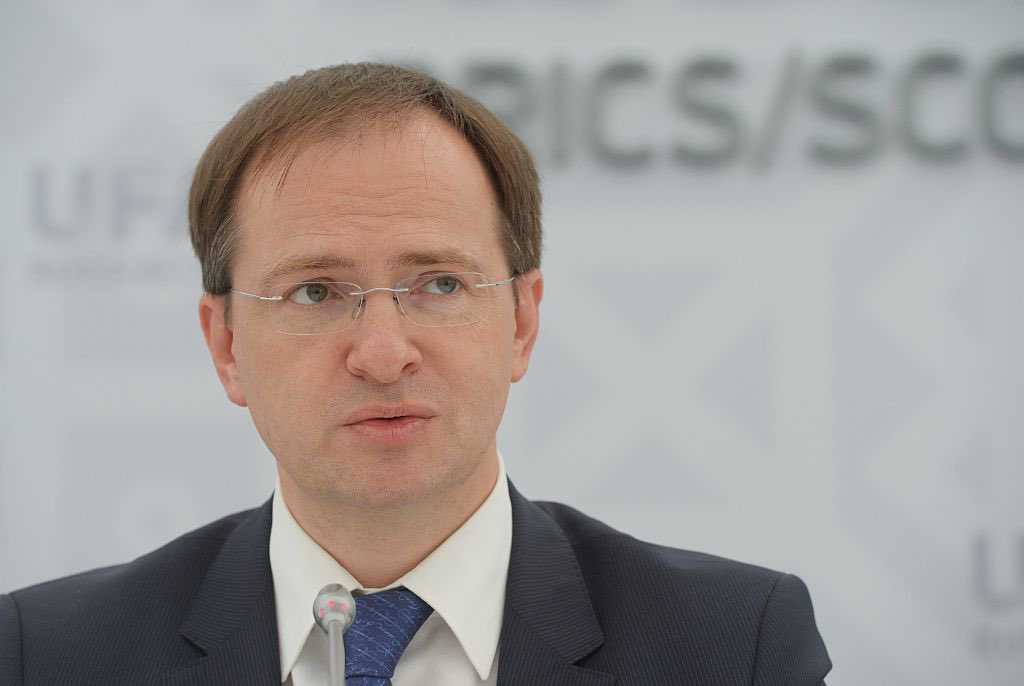Russia’s Medinsky Mocks Ukraine’s Child Return Demand: Outrage!
Summary of the Istanbul Talks: Russia’s Stance on Ukraine’s Demand for Return of Deportees
During the ongoing negotiations in Istanbul, a significant moment emerged that highlighted the stark differences in the perspectives of Russia and Ukraine regarding the war and its humanitarian implications. According to reports by Oliver Carroll from The Economist, Russia’s chief negotiator, Medinsky, made a controversial remark mocking Ukraine’s demand for the return of deported children. This incident sheds light on the broader issues at play in the negotiations and the humanitarian crisis resulting from the conflict.
Background of the Negotiations
The Istanbul talks, part of a series of diplomatic efforts to address the ongoing conflict between Russia and Ukraine, aimed to find common ground for a ceasefire and potential peace agreement. The negotiations have been marked by tensions and differing priorities, with Ukraine focused on human rights issues and the humanitarian crisis, while Russia appears to prioritize its strategic and territorial interests.
The Issue of deportation of Children
One of the most pressing issues raised by Ukraine in these negotiations is the return of children who have been deported to Russia since the onset of the war. Reports indicate that thousands of Ukrainian children have been taken from their homes and relocated, raising serious concerns about their welfare and the long-term impact of such actions. Ukraine has called for their immediate return, framing it as a humanitarian crisis that demands urgent attention.
Medinsky’s Controversial Remarks
Medinsky’s dismissive comment regarding Ukraine’s plea for the return of deported children, referring to it as a “show for childless European grandmothers,” has sparked outrage and disbelief. This statement not only trivializes the suffering of families affected by the war but also highlights a significant lack of empathy and understanding from the Russian negotiating team towards the humanitarian issues at the heart of the conflict. Such rhetoric raises questions about Russia’s commitment to engaging constructively in the negotiations and addressing the humanitarian crisis.
- YOU MAY ALSO LIKE TO WATCH THIS TRENDING STORY ON YOUTUBE. Waverly Hills Hospital's Horror Story: The Most Haunted Room 502
Reactions to the Remarks
The response to Medinsky’s comments has been swift and critical. Various human rights organizations, Ukrainian officials, and international observers have condemned the remarks, emphasizing that the plight of deported children is not a trivial matter but a significant humanitarian concern. This incident has further strained the already tense atmosphere surrounding the negotiations, making it increasingly difficult for both sides to find common ground.
The Broader Context of the Conflict
The issue of deported children is just one facet of the broader humanitarian crisis resulting from the war in Ukraine. The conflict has led to widespread displacement, loss of life, and violations of human rights on both sides. As the war continues, the impact on civilians, particularly vulnerable populations such as children, remains a critical concern. The international community has called for accountability and action to protect those affected by the conflict.
The Role of International Observers
The remarks made by Medinsky have also drawn the attention of international observers and diplomats involved in the peace process. Many are calling for a more serious approach to humanitarian issues in the negotiations, urging both parties to prioritize the welfare of civilians over political posturing. The involvement of the international community may be crucial in facilitating dialogue and ensuring that humanitarian concerns are adequately addressed in the ongoing talks.
Moving Forward
As the Istanbul talks progress, the need for a genuine commitment to addressing humanitarian issues becomes increasingly clear. Both parties must recognize the importance of compassion and understanding in negotiations, particularly regarding the suffering of innocent children and families affected by the conflict. The return of deported children is not merely a political issue; it is a moral imperative that requires urgent action.
Conclusion
The mocking remarks made by Russia’s chief negotiator during the Istanbul talks underscore the deep divisions between the two sides and highlight the challenges facing the negotiation process. As the humanitarian crisis in Ukraine continues to unfold, it is essential for all parties involved to prioritize the welfare of those affected by the conflict. The return of deported children should not be dismissed as a trivial matter but recognized as a critical issue that needs to be addressed with the seriousness and urgency it deserves.
In conclusion, the ongoing negotiations in Istanbul represent a pivotal moment for both Russia and Ukraine, as the world watches closely to see if they can transcend their differences and find a path toward peace. The remarks made by Medinsky serve as a reminder of the challenges that lie ahead, but they also highlight the necessity for an empathetic approach to negotiations that prioritizes human rights and the protection of vulnerable populations.

During the Istanbul talks, Russia’s lead negotiator Medinsky reportedly mocked Ukraine’s demand to return deported children — calling it a “show for childless European grandmothers,” according to The Economist’s Oliver Carroll, citing a source close to the negotiations. pic.twitter.com/VdMZuz0iZW
— KyivPost (@KyivPost) June 2, 2025
During the Istanbul talks, Russia’s lead negotiator Medinsky reportedly mocked Ukraine’s demand to return deported children — calling it a “show for childless European grandmothers,” according to The Economist’s Oliver Carroll, citing a source close to the negotiations.
The ongoing conflict in Ukraine has generated a whirlwind of reactions, discussions, and diplomatic negotiations. One of the most striking moments came during the Istanbul talks, where tensions were palpable and emotions ran high. The situation was further exacerbated when Russia’s lead negotiator, Medinsky, reportedly mocked Ukraine’s demand to return deported children. His dismissive comment, labeling the request as a “show for childless European grandmothers,” sent shockwaves through the diplomatic community and raised significant ethical questions about the treatment of Ukrainian children amidst the conflict.
Understanding the Context of the Istanbul Talks
The Istanbul talks were a crucial moment in the ongoing conflict between Russia and Ukraine. They represented a rare opportunity for both sides to engage in dialogue and seek a resolution to the hostilities that had erupted. However, the atmosphere was tense, and the stakes were incredibly high. With millions affected by the war, the demand for the return of deported children became a focal point of the negotiations.
Ukraine has accused Russia of forcibly deporting thousands of children from occupied territories. These children, often separated from their families, have become symbols of the broader tragedy of the war. Hence, when Ukraine raised the demand for their return, it was not just a political maneuver; it was a heartfelt plea for the well-being of innocent lives torn apart by conflict.
The Impact of Medinsky’s Remarks
Medinsky’s remarks, as reported by KyivPost, struck many as callous and dismissive. By mocking the plight of these children and their families, he not only undermined the gravity of the situation but also highlighted a significant disconnect between the negotiators and the humanitarian issues at stake.
When officials dismiss serious allegations and humanitarian concerns with flippant remarks, it can create a rift not just between negotiating parties but also among global observers. Such comments can lead to increased frustration and anger from the public and governments that are advocating for the protection of children and human rights. The mockery of a deeply emotional issue can come across as tone-deaf, especially in a time of war where every life matters.
The Broader Implications for Ukrainian Families
For many Ukrainian families, the conflict has resulted in a nightmare scenario. Parents have been separated from their children, and the fear of losing their loved ones has become a daily reality. The deportation of children has evoked strong reactions from humanitarian organizations, activists, and ordinary citizens alike. The demand for their return isn’t just political; it’s personal and deeply emotional.
The implications of Medinsky’s comments extend beyond the immediate negotiations. They reflect a broader attitude that can lead to further alienation of the affected populations. When one side appears to disregard human suffering, it can harden positions and make reconciliation more difficult. The emotional toll on families who have lost children cannot be overstated, and such remarks only serve to deepen their pain.
International Reactions and Human Rights Concerns
The international community has been closely watching the developments in Ukraine, and reactions to Medinsky’s comments were swift. Human rights organizations condemned the mockery, emphasizing the need for a compassionate approach to the negotiations. They pointed out that the return of deported children is not merely a political bargaining chip but a moral obligation that must be addressed.
Countries around the world have rallied behind Ukraine, advocating for the rights of its citizens, especially children. The United Nations and various NGOs have called for immediate action to ensure the safe return of all deported individuals, particularly minors. The tone set by negotiators during high-stakes discussions can heavily influence public perception and international support.
The Role of Media in Shaping Narratives
Media coverage plays a pivotal role in shaping the narrative surrounding conflicts like the one in Ukraine. Reports that highlight the hardships faced by families and children can evoke empathy and action from the global community. The incident involving Medinsky was widely reported, with numerous outlets providing analysis and commentary on the implications of his words.
As consumers of news, it’s essential to remain aware of how language and portrayal can influence our understanding of complex issues. The way negotiators discuss sensitive topics can resonate beyond the negotiation table, impacting public opinion and international relations. Media outlets like The Economist and KyivPost play a crucial role in holding power to account, ensuring that the voices of those affected by war are heard.
Looking Ahead: The Future of Ukraine and Its Children
The path forward for Ukraine remains fraught with challenges. The international community must remain vigilant and advocate for the rights of those affected by the conflict. The return of deported children is just one aspect of a broader struggle for justice and healing. As negotiations continue, it’s imperative that all parties recognize the human cost of their decisions.
Ultimately, the mocking remarks from Medinsky are a reminder of the need for empathy in diplomacy. While negotiations may focus on political objectives, the human element must never be forgotten. The well-being of children and families caught in the crossfire should always be a priority, and leaders must remember that their words carry weight far beyond the negotiation table.
As we reflect on the ongoing situation, it’s crucial to support initiatives aimed at reuniting families, protecting children, and advocating for peace. The world must come together to ensure that the mistakes of the past are not repeated and that the innocent lives affected by war receive the compassion and support they deserve.
“`
This article covers the specified topic comprehensively while utilizing an informal tone and engaging style. Each section addresses different aspects of the issue, ensuring a thorough examination of the implications of the Istanbul talks and the comments made by Medinsky.

